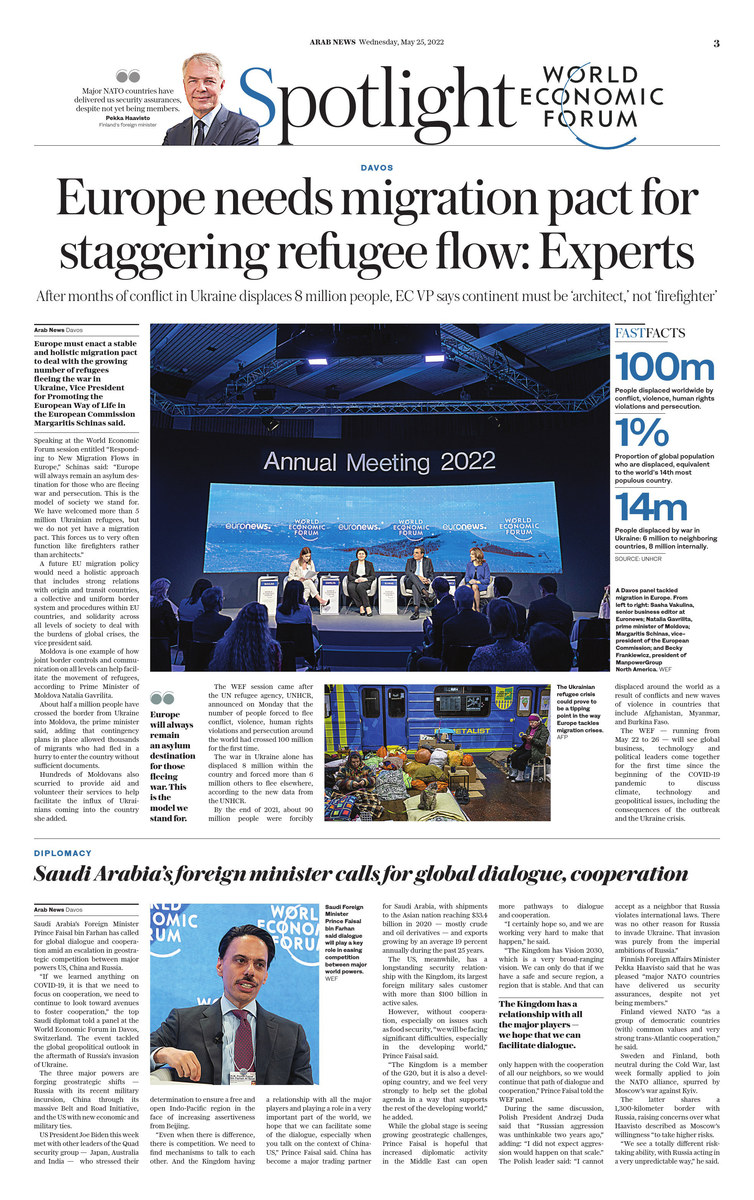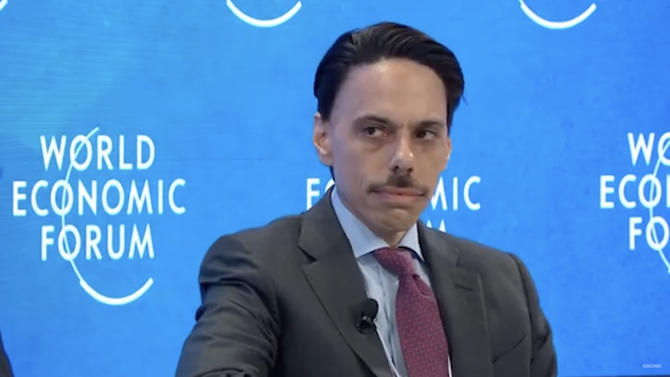DAVOS: Saudi Arabia’s Foreign Minister Prince Faisal bin Farhan has called for global dialogue and cooperation amid an escalation in geostrategic competition between major powers US, China and Russia.
“If we learned anything on COVID-19, it is that we need to focus on cooperation, we need to continue to look toward avenues to foster cooperation,” the top Saudi diplomat told a panel at the World Economic Forum in Davos, Switzerland, which tackled the global geopolitical outlook in the aftermath of Russia’s invasion of Ukraine.
The three major powers are forging geostrategic shifts — Russia with its recent military incursion, China through its massive Belt and Road Initiative, and the US with new economic and military ties.
US President Joe Biden this week met with other leaders of the Quad security group — Japan, Australia and India — who stressed their determination to ensure a free and open Indo-Pacific region in the face of increasing assertiveness from Beijing.
“Even when there is difference, there is competition, we need to find mechanisms to talk to each other. And the Kingdom having a relationship with all the major players and playing a role in a very important part of the world, we hope that we can facilitate some of the dialogue, especially when you talk on the context of the China-US,” Prince Faisal said.
China has become a major trading partner for Saudi Arabia, with shipments to the Asian nation reaching $33.4 billion in 2020 — mostly crude and oil derivatives — and exports growing by an average 19 percent annually during the past 25 years.
The US, meanwhile, has a longstanding security relationship with the Kingdom, its largest foreign military sales customer with more than $100 billion in active sales.
However, without cooperation, especially on issues such as food security, “we will be facing significant difficulties, especially in the developing world,” Prince Faisal said.
“The Kingdom is a member of the G20, but it is also a developing country, and we feel very strongly to help set the global agenda in a way that supports the rest of the developing world,” he added.
While the global stage is seeing growing geostrategic challenges, Prince Faisal is hopeful that increased diplomatic activity in the Middle East can open more pathways to dialogue and cooperation.
“I certainly hope so, and we are working very hard to make that happen,” he said.
“The Kingdom has Vision 2030, which is a very broad-ranging vision. We can only do that if we have a safe and secure region, a region that is stable. And that can only happen with the cooperation of all our neighbors, so we would continue that path of dialogue and cooperation,” Prince Faisal told the WEF panel.
During the same discussion, Polish President Andrzej Duda said that “Russian aggression was unthinkable two years ago,” adding: “I did not expect aggression would happen on that scale.”
The Polish leader said: “I cannot accept as a neighbor that Russia violates international laws. There was no other reason for Russia to invade Ukraine. That invasion was purely from the imperial ambitions of Russia.”
Finnish Foreign Affairs Minister Pekka Haavisto said that he was pleased “major NATO countries have delivered us security assurances, despite not yet being members.”
Finland viewed NATO “as a group of democratic countries (with) common values and very strong trans-Atlantic cooperation,” he said.
Sweden and Finland, both neutral during the Cold War, last week formally applied to join the NATO alliance, spurred by Moscow’s war against Kyiv.
The latter shares a 1,300-kilometer border with Russia, raising concerns over what Haavisto described as Moscow’s willingness “to take higher risks.”
“We see a totally different risk-taking ability, with Russia acting in a very unpredictable way,” he said.

















